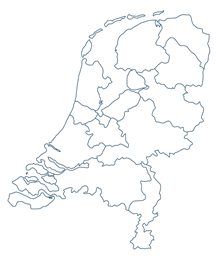6G Fieldlabs
The National 6G Testbed consists of various locations in the Netherlands that are interconnected through an advanced infrastructure.
The central testbed, located at TNO in The Hague, forms the technical heart of the initiative. It offers advanced testing capabilities and facilitates connectivity between the 6G Fieldlabs. The 6G Fieldlabs in Delft, Eindhoven, Groningen and Amersfoort provide hands-on support and are specialized in specific sectors and applications.

Hotspots
6G Fieldlab Groningen
Partner: ICCS Groningen
The 6G Fieldlab in Groningen specializes in positioning and sensor fusion applications, including autonomous driving solutions that do not rely on GPS. Thanks to its location in the spacious and quiet surroundings of the Northern Netherlands, there is ample room for activities such as drone experiments and autonomous sailing or driving.
6G Fieldlab Delft
Partner: Do Iot Fieldlab
The 6G Fieldlab in Delft focuses on testing wireless innovations in realistic environments. With a strong emphasis on IoT applications over private 5G and future 6G networks, it develops solutions for sectors such as mobility, logistics, healthcare, and security.
6G Fieldlab Den Haag
Partner: TNO
In the 6G Fieldlab in The Hague, the focus is on the overall architecture and blueprints of the new 6G network. It also examines the integration and testing of network components and functionalities, as well as the development of network orchestration capabilities. Specifically, practical use cases are being explored, such as teleoperated driving, remote healthcare, and industrial automation.
6G Fieldlab Amersfoort
Partner: RDI
The 6G Fieldlab in Amersfoort focuses on the safe and reliable testing of digital infrastructure, with an emphasis on risk detection, societal impact, and supporting innovative applications within the 6G ecosystem.
6G Fieldlab Eindhoven
Partner: Brainport Digital Factory
The 6G Fieldlab in Eindhoven focuses on the transformation of Industry 4.0 by wirelessly connecting industrial components, sensors, and PLCs via 6G networks. Other technologies integrated into this innovation include digital twin technology, edge computing, end-to-end low-latency communication, and large language models (LLMs).
